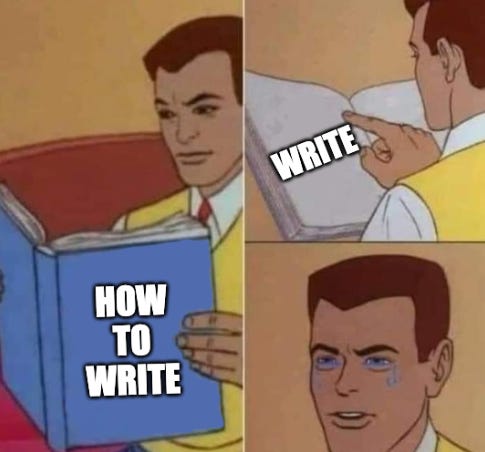How To Stop Being Self-Conscious
Plus, the idea of observing without evaluating in our communication.
Hi friends,
This week I have been focusing on self-consciousness, which is when we have an excessive preoccupation with thoughts of how we see ourselves and how others perceive us.
I have dealt with self-consciousness throughout my life, which caused many inner struggles. I would create an ideal image for each role in life. For example, I had this image of the perfect designer in my head. Any trigger, such as meeting someone more senior than me or with better skills, would immediately become flooded with anxious emotions. My inner critic would show up and tell me that I wasn't good enough, so keep a low profile and kept to myself. The self-conscious emotions were keeping me down and holding me back.
I did find a way out, and that was through acceptance. I started accepting who I was and my past experiences, both good and bad. By shining a light on the parts I had considered shameful, which brought on the self-conscious feelings, I could take power away from those parts to do any more damage.
So if you find yourself becoming self-conscious and start worrying about how you or others perceive you, take a moment to shine the light on your past experiences that trigger those emotions. Use journaling to collect your thoughts as they happen. The more you explore the hidden experiences and bring them to the surface to accept them, the more you see their power dissolve.
Now, remember this won't happen overnight, but by continuously examining those parts you have hidden away because of shame or guilt, accept them for making you who you are today, and you can begin to break free from their grip once and for once all.
Observing without Evaluating
I finally got around to reading the book Nonviolent Communication (NVC) by Marshall B. Rosenberg, Ph.D. Don't let the title of the book scare you. NVC can help us communicate with more empathy, collaboration, authenticity, and freedom, in all parts of our lives.
As Dr. Rosenberg put it:
"Nonviolent Communication shows us a way of being very honest, without any criticism, insults, or put-downs, and without any intellectual diagnosis implying wrongness."
The first idea that stood out for me was of observing without evaluating.
When we communicate with others, we need to observe what we are seeing, hearing, feeling, and touching and how it affects us without mixing in the evaluation of the action, which can come across as criticism.
Let's look at two statements to see the difference:
"Jeremy procrastinates."
This statement is an evaluation of what we observe Jeremy to do, which sounds like a criticism.
Let's rephrase it by only stating the observation:
"Jeremy starts his research at the very last minute."
As you can see, the observation-only statement is less likely to be offensive and enables clearer communication.
The goal of Nonviolent Communication isn't to altogether remove any evaluation from our language. Instead, it is to separate observation and evaluation from each other. NVC brings clearer and more empathetic communication by removing generalizations and veiled criticisms and helps us take responsibility for the words we use to communicate at work and with our families.
Have you read Nonviolent Communication? I would love to know what your biggest takeaway was. Share your thoughts in the comments.
🧠 Food for thought
This video puts our everyday problems into perspective.

Yes, it’s time to ditch the “How To” books and just write! 😅
A Poem
I can.
I can begin.
I can begin again.
I can begin again to be happy.
I can begin again to be joyful in life.
I can begin again to be present in each moment.
I can begin again to be myself.
I can begin again.
I can begin.
I can.
We can begin again!
That's it for now. I hope you have a restful weekend full of laughter, joy, art, and books.
Till next week, stay strong!
With gratitude,
Rizwan 💜







